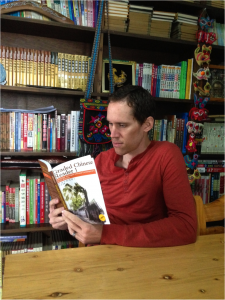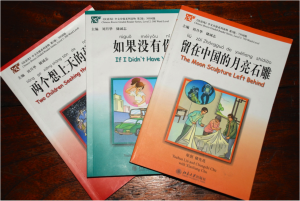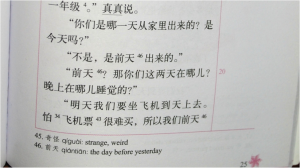10 reasons to visit… China
China is an amazing country, one that should be on every traveler’s must visit list. Few countries possess the wide variety of experiences you will find in the Middle Kingdom. While you are in this amazing country, be sure to visit the province of Yunnan, one of the lesser known, but most beautiful destinations within China. Here are ten terrific reasons why you should visit China, by Anna Smith, who studies Chinese in China at Keats School.
1. Breath-taking landscapes
As one of the largest countries in the world, China boasts incredibly diverse landscapes. Virtually whatever scenery you find most beautiful, you will find it in China. From the Northwest deserts to the Southeast seacoast, high mountain ranges to fertile plains, the frozen beauty of Harbin to the lush warm tropics of Xishuangbanna, China has it all. Hangzhou is famous for its stunning West Lake views. Suzhou has beautiful garden views and winding rivers with traditional architecture. And Hainan is the tropical paradise of the Orient; known as the ‘Eastern Hawaii’; it is China’s own paradise island.
2. Wonderful people
As the most populous nation in the world, China has plenty of people to meet. Chinese people generally love Westerners, so most are quite friendly. Everywhere we go, people want to stop and chat and take pictures with us. You can meet some amazing people and hear many intriguing life stories in the Middle Kingdom.
3. Awesome language
To a native English speaker, Mandarin can seem intimidating because it is so different to European languages. But this uniqueness makes it all the more beautiful and amazing to experience. Chinese characters are stunningly beautiful. Listening to tonal Mandarin can be like experiencing a new kind of music for the first time. If you already playing with the thought of challenging yourself, then you should definitely check out these reasons to study Chinese at Keats School.
4. Incredible food
While known for its tea and rice, there is much more to Chinese cuisine than is commonly known by most Westerners. And this cuisine varies greatly by region. In the north, noodles are the most common meal staple, but in the south, almost everything is served over rice. Different regions, like Sichuan and Hunnan, are known for their unique spicy food, while coastal regions boast a variety of seafood. Some of the most fun and interesting foods to try are street foods, such as roasted sweet potatoes and Chinese barbecue, shao kao.
5. Rich history
Few places have such a vast and rich history as the Middle Kingdom. The Great Wall of China and the Terracotta Warriors are some of the most well known ancient tourist attractions. The Forbidden City and Temple of Heaven in Beijing are also must-see attractions to learn about Chinese history and culture.

Royal Palace, Lijiang. Ancient traditional buildings can still be easily seen in many cities in China.
6. Modern development
At the same time, China boasts some of the largest cities in the world and is becoming more modern everywhere you look. Nowhere else have I ever seen so many high rises or amazing skylines as in China. Shanghai epitomises modern day China, with the famous modern riverfront skyline known as the Bund, large European style buildings, and its particularly distinctive Pearl of the Orient tower.
7. Amazing markets and exciting products
True, China makes a wide variety of products that are exported all over the world, but they have many unique products as well. Fine silks, exquisite China tea sets, elaborately carved jade, and expensive aged tea are some of the most sought after high-priced commodities. But Chinese Calligraphy, bamboo baskets, traditional Chinese knots, and other handcrafted items are distinctly beautiful as well. Provinces in the southwest of China have a wide variety of unique items hand crafted by the many minorities within its borders.
8. Fascinating diversity
One of the most amazing things about China is the variety of experience that can be enjoyed in one place. Old and new, sweet and spicy, rough and smooth, all combine into a rich cultural tapestry. Because of its ethnic and topographical diversity, Yunnan holds incredible diversity in one province.
9. Mind-blowing memories
Because there are so many unique and diverse things to experience, a trip to China is sure to create some incredible memories. These experiences will travel with you for the rest of your life. My family and I have experienced so many wonderful memories. Especially exciting to my young boys are eating jiaozi and watching fireworks during Spring Festival. Our experiences shape who we are as people. One of the best reasons to visit any new place is to literally expand your horizons, as it can change your thoughts and life. China’s incredible variety allows you to enjoy a multitude of new experiences and will forever change you.
10. Charming calligraphy
The ancient art of Chinese calligraphy cannot be fully appreciated without visiting China and seeing masters create their works of art in person. Even in the smallest shop, a true master can create amazing works of art. Words become art to be enjoyed be all, even if you don’t understand the meaning. But there are many places where you can learn famous Chinese sayings and begin to learn Chinese calligraphy for yourself, which deepens your admiration for its beauty even more. Being able to write in Chinese is a very valuable skill, but often feels impossible to learn. Once you understand the fundamentals, you will see that this is indeed something that you can learn.
Anna Smith
You can’t beat visiting China for learning the language – but before you go, remember to learn a few basic words with uTalk to get you started.
Translation mistakes – not just for laughs
Today we have a guest post from language company, thebigword, on famous translation mistakes, some of which had serious consequences. Mistakes are common, and to be expected, when you’re learning a language – but when it really matters, it’s important to get it right!
Over the years there have been many translation ‘slip ups’ and faux pas, and whilst the mistakes may seem funny some can have a far more serious impact. Reputable language solution agencies such as thebigword, specialise in international translation and you can bet your bottom dollar that they wouldn’t be caught making slip ups like the following.
There have been many incidences over the years where mis-translation can go from highly amusing to potentially life damaging. For example, Mead Johnson Nutritionals in 2003 had a case raised against them when 4.6 million cans of baby food had to be recalled. The translation error, which was caused by effectively being lazy, meant that the prescribed recipe translated into Spanish could have caused massive health issues, according to the U.S. Food and Drug Administration.
 Businesses and the world financial markets have also paid the price at the hands of poor translation, most notably when the price of the U.S. dollar was sent spiralling after an incorrect translation of an article by Guan Xiangdong for the China News Service. Guan’s original piece was meant to be a speculative overview of a series of financial reports, but instead it was translated in a more aggressive tone, which ultimately made readers in the U.S. think it was an authoritative warning and they should move their money and sell shares.
Businesses and the world financial markets have also paid the price at the hands of poor translation, most notably when the price of the U.S. dollar was sent spiralling after an incorrect translation of an article by Guan Xiangdong for the China News Service. Guan’s original piece was meant to be a speculative overview of a series of financial reports, but instead it was translated in a more aggressive tone, which ultimately made readers in the U.S. think it was an authoritative warning and they should move their money and sell shares.
The Chicago Tribune published a highly shareable article not that long ago when it collated a series of images captured by tourists on their worldly travels. Examples from China included, ‘man toilet’ and ‘The government decides to cracking down fakes intensively for another three years’. However, our favourite has to be, ‘Because there is the situation when a step is bad, please be careful’. We’re pretty positive that was meant to say ‘mind your step’.
Of course, no faux pas goes unnoticed in the world of marketing, where language on billboards or even newspaper advertising isn’t missed by the most ardent observer.
The popular Dairy Association campaign, ‘Got Milk?’, raised an eyebrow or two when in Mexico it was translated to ‘Are you lactating?’ And in France, Colgate produced a new range of toothpaste called Cue; little did anyone realise that it had the same name as a well-known adult magazine. Now that is what we call a faux pas!
Do you have any favourite translation errors? Please share them in the comments below.
Learning Mandarin: Never call your mother a horse, and other tips
Cameron’s spending a couple of weeks with us here at EuroTalk for work experience. In today’s blog post, he explains why he chose to learn one of the world’s most difficult languages, and gives his suggestions for anyone who’s thinking about taking up the challenge.
Are you learning Mandarin? What drew you to the language? And do you have any tips of your own to share?
 Mandarin is recognised as one of the hardest languages to learn in the world, but with great difficulty comes great reward, as Mandarin is also one of the most useful languages in the world. Mandarin is so useful because it is spoken by almost 15 percent of the earth’s population natively, which is almost 1 billion people, and this figure does not include non-native speakers like myself. Also, China is one of the economic and industrial giants of the 21st century, and it’s still growing. Therefore Mandarin is very useful if you want to do business with the people involved in the global superpower that is China. As well as the practical reasons, Mandarin is also a great language to learn for cultural reasons, because, as you probably know, when learning any language, the culture of that country comes hand in hand, and China has a fascinating culture with a rich history.
Mandarin is recognised as one of the hardest languages to learn in the world, but with great difficulty comes great reward, as Mandarin is also one of the most useful languages in the world. Mandarin is so useful because it is spoken by almost 15 percent of the earth’s population natively, which is almost 1 billion people, and this figure does not include non-native speakers like myself. Also, China is one of the economic and industrial giants of the 21st century, and it’s still growing. Therefore Mandarin is very useful if you want to do business with the people involved in the global superpower that is China. As well as the practical reasons, Mandarin is also a great language to learn for cultural reasons, because, as you probably know, when learning any language, the culture of that country comes hand in hand, and China has a fascinating culture with a rich history.
Furthermore, if you learn Mandarin, that adds an extra incentive to make a trip to China to practise your newfound passion, and what’s a better way to spend your holidays than walking the great wall of China or paying a visit to the Terracotta Army? Additionally, if you’re the kind of person who relishes a new challenge, Mandarin is the perfect language for you, because, as I previously stated, it’s one of the hardest languages to learn in the world. On top of this, Mandarin will also appeal to you arty types out there in the form of calligraphy; this is a form of Chinese writing that involves painting the characters onto special paper called Xuanzhi (宣紙).
The most important thing to remember when learning Mandarin is not to get overwhelmed by the vast number of characters in the language; in fact I wouldn’t even worry about characters until you become more advanced in the language. Instead, begin by focusing on the oral side of the language, in particular, the pronunciation of words. In Mandarin pronunciation is key, for example, the word ‘ma’ can be said in four different ways and means four different things, so be careful not to call your mother a horse by pronouncing this word wrong!
A good thing to use to mark your progress of learning Mandarin is the HSK exams. These exams are held once a month and there are numerous different levels to work through, ranging from beginners exams to exams for people who are almost fluent, as well as the added bonus that they are recognised qualifications throughout China.
Good luck!
Cameron
If you’re interested in learning Mandarin, you can get started completely free with uTalk for iOS. Enjoy!
15 cultural faux pas to avoid when travelling
Before you go on holiday, or on a business trip abroad, it’s a great idea to learn a little of the local language. But getting along with people is about much more than just the words you say. There are other rules too, so here are our top tips to avoid misunderstandings abroad.
1. Be very careful when exchanging business cards in Japan: they aren’t just cards, but representations of the giver and should be handled with some ceremony. NEVER write on a business card or put it in your back pocket, as this is considered disrespectful.
2. Don’t talk about work over dinner in New Zealand, even if you’re having a meal with your colleagues. It’s fine to talk business over lunch, though.
3. In Muslim countries it’s considered an insult if you show the soles of your feet, so watch how you sit.
4. If you’re in Hungary and you’ve been told your meeting is at ‘fél négy’ (‘half four’), don’t turn up at 4:30 – ‘fél négy’ actually means half an hour TO four, so you’ll need to be there at half past three.
5. On the other hand, if you’ve been invited to a gathering in France, always aim to arrive 15-30 minutes late, to allow the host time to get ready.
6. Making a circle with your forefinger and thumb as another way of saying ‘OK’ is seen as an extremely offensive gesture in Brazil. As is the ‘thumbs up’ gesture in Iran, and showing your palm in Greece. It might be better to just avoid hand gestures altogether…
7. In Germany, not making eye contact when you clink glasses is considered very rude. It also, apparently, means you’ll have seven years’ bad luck in the bedroom. So even if you’re not worried about being thought bad-mannered, it might be worth making the effort. Just in case.
8. In Bulgaria, nodding your head means no, and shaking your head means yes, which is the opposite of what most of us are used to. This is worth remembering or you could get yourself into all kinds of trouble.
9. It’s been illegal to bring chewing gum into Singapore since 2004, because of the damage being caused to public buildings and facilities by people leaving their gum behind. You can also be fined for not flushing a public toilet.
10. In Russia, if you’re giving someone flowers, make sure you give them an odd number. Even numbers are for funerals.
11. It’s important to show respect to your elders in Asia, so don’t call them by their name; instead use ‘Auntie’ or ‘Uncle’, even if you don’t know them.
12. When eating a meal in Spain, you’ll be expected to clear your plate, and leaving some food is seen as rude. In Russia, on the other hand, you’re expected to leave a little as a sign that your host has provided enough to fill you up. And in China, a polite belch when you finish eating is considered a compliment to the chef, although it’s frowned upon in many other countries.
13. Never say anything disrespectful about the king in Thailand, as this could land you in prison for several years.
14. Make sure you’re appropriately dressed before going to church in Italy. This means your shoulders, knees and midriff should all be covered, or you won’t be allowed in.
15. In Malawi, it’s common for people of the same sex to hold hands; this is a sign of close friendship, so don’t worry if someone tries to take your hand. It’s a compliment. Men and women holding hands is rare, though, and may be frowned upon.
As always, if anyone has any others, we’d love to hear from you!













